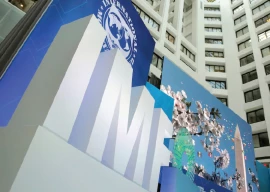
Coronavirus to hurt major sectors of economy
Alternative raw material supply routes can be tapped to keep industries running
LAHORE: As coronavirus is still spreading its wings in China and other parts of the world, Pakistan’s business community has started looking towards alternatives for raw material supply as a precautionary measure.
A recent report, launched by Spectrum Securities Limited, stated that the virus outbreak would have an adverse impact on different sectors of the country’s economy if infections continued for the next few months.
The report said that the lockdown in China and the limits put on transportation routes were causing disruption to the supply of raw material and finished goods.
As a result, Pakistan’s manufacturing activities may slow down as major raw material and finished goods come from China and a further delay could have an adverse impact, which could fuel inflation and hurt some key sectors of the economy.
Steel industry
The long-term impact of the coronavirus is still up in the air in China and around the globe. Some experts predict the impact will be felt on the global steel industry for at least in the medium term as China is the largest producer of steel and alloy.
Meanwhile, India is focusing on increasing its share of steel in the international market.
Pakistan’s steel industry is dependent on raw material imports from China and Japan. If the virus continues to take its toll beyond March and April, Pakistan will have to move towards an expensive alternative, which will increase the cost of production and will slow down manufacturing and construction activities in the country.
Moreover, India is the second-largest producer of steel after China with annual output of over 106 million tons (MT). Pakistan has the opportunity to buy raw material for steel production from India.
However, in the past couple of years, the excessively tense relationship between Pakistan and India has restricted the import of different industrial raw materials, including some pharma raw materials.
Paper industry
Pakistan also imports raw material for the packaging and paper industry, which includes wood and agricultural residue.
Amid the coronavirus outbreak, Pakistan’s paper industry may suffer from raw material shortage and might need to search for an alternative, which could be expensive and take time, to continue to run their production lines.
China, the United States and Germany are the top three pulp and paper-producing countries. In Pakistan, imported RIM papers, usually A4, have a significant importance in daily-life consumption, which are mostly imported from Indonesia and China.
On an average, companies have three to four months of raw material backup in warehouses to cater to domestic demand. If the virus threat exists beyond that, Pakistani companies will move to sign contracts with other countries, though China and Indonesia are considerably cheap suppliers. Switching to alternatives will result in an increase in prices of the products.
Chemical sector
The report added that due to the restriction on transportation by China, Pakistan’s chemical industry was likely to be hurt since the country in 2018 imported 31% of organic chemicals and 24% of miscellaneous chemical products from the neighbouring country.
Polyester and downstream production will likely remain under pressure till the end of March-April. The situation would worsen if the epidemic was not brought under control soon, it said.
Amid hike in the demand for medical supplies and protective gears, the demand for polypropylene fibre has increased, which is the main raw material for these goods.
Pharmaceutical sector
China is a major manufacturer of low-cost generic drugs and raw material. Most pharmaceutical companies fully or partially depend on the Chinese raw metrical.
Pakistan relies on China for active pharmaceutical ingredients and other chemicals used in medicines ie Paracetamol, Penicillin, painkiller Ibuprofen and popular diabetes drugs. However, some semi-APIs are imported from India.
Imports from China contribute 25% to the total chemical and pharmaceutical imports in Pakistan. Although this hefty number can affect the production of drugs in the country, it depends on the inventory level which local pharma companies maintain.
Banking sector
As China is the second largest trading partner of Pakistan, the coronavirus will have a significant impact on bilateral trade. As a result, the portion of income derived by banks from international trade will be impacted.
As the world braces for a wider impact of the virus, banks in Pakistan too are expected to experience turbulence in their earnings.
Published in The Express Tribune, March 7th, 2020.
Like Business on Facebook, follow @TribuneBiz on Twitter to stay informed and join in the conversation.

1732084432-0/Untitled-design-(63)1732084432-0-270x192.webp)













COMMENTS
Comments are moderated and generally will be posted if they are on-topic and not abusive.
For more information, please see our Comments FAQ